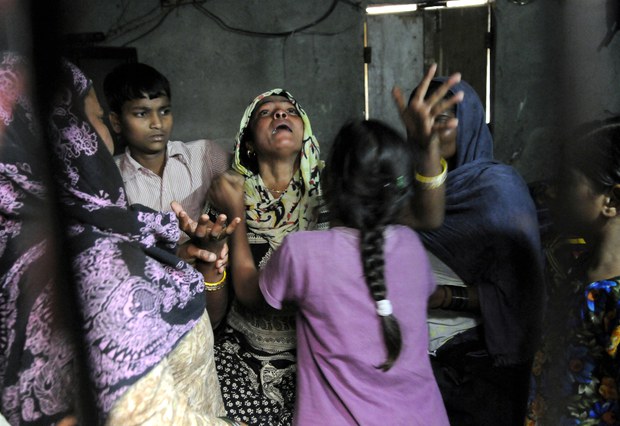String of Violent Sexual Assaults Strikes India
2016.03.25
Bengaluru, India
 The mother of an Indian girl who died after being raped and set on fire cries out during her daughter’s funeral in Noida, near New Delhi, March 9, 2016.
The mother of an Indian girl who died after being raped and set on fire cries out during her daughter’s funeral in Noida, near New Delhi, March 9, 2016.
A teenager’s brutal rape and murder on the outskirts of New Delhi earlier this month has rekindled questions over the safety of women in India.
The 16-year-old girl was allegedly raped on the roof of her home in Noida, Uttar Pradesh state, then set on fire on March 6. Ninety-five percent of her body was burned, and she succumbed to her injuries at a New Delhi hospital three days later.
Police have arrested a 19-year-old suspect – who allegedly knew the victim for two years – and charged him with several offenses, including rape, murder, assaulting a minor and causing grievous injury.
The attack was the latest in a string of horrific sexual crimes in the country, which has carried the dubious distinction of being unsafe for women following the notorious gang-rape of and fatal attack on a 23-year-old paramedic student aboard a moving bus in New Delhi in 2012.
Sexual crimes remain a serious challenge for rapidly developing, yet conservative, India, which has a population of about 1.25 billion people, women’s rights activists said.
The “lack of respect for women in the Indian society” is largely to blame for the high number of sexual crimes, often labelled as under-reported because victims are afraid of being socially stigmatized, said Vrinda Grover, a prominent human rights activist and lawyer.
“Indian society needs to respect a woman’s sexual autonomy. It is one of the key factors to take into consideration if we are serious about reducing the number of sex crimes in India,” Grover told BenarNews.
The Indian public needs to learn to respect a woman’s freedom to choose their husbands, boyfriends or partners, she added.
According to latest figures available from the National Crime Records Bureau (NCRB), nearly 133,000 sexual offenses were reported across India in 2014, a significant increase from the previous year.
Activists believe the increase in the number of sexual offenses is partially due to various initiatives taken by the government and women groups in exhorting victims to report such crimes more openly in the backdrop of the infamous 2012 Delhi gang-rape.
An overwhelming majority of the perpetrators are known to the victims, NCRB statistics show.
Child abuse on rise
Mixed in with this is a rise in cases of sexual abuse of children across India, according to women’s and child-rights activists.
Between November 2012 and March 2015, more than 45,000 sexual offenses were reported against minors, Union Minister of Women and Child Development Maneka Gandhi said.
Out of 45,498 cases, 4,316 cases were pending with the state police and 35,700 cases were before the courts under the Protection of Children against Sexual Violence Act (POCSA), Gandhi said.
But cases of marital rape appear to be immune from prosecution. The minister recently angered feminists when she told the Indian parliament that it would not be possible pass a law protecting married women from being raped by their spouses.
“The concept of marital rape, as understood internationally, cannot be suitably applied in the Indian context, due to the level of illiteracy, poverty, myriad social customs and values, religious beliefs, mind-set of the society to treat the marriage as a sacrament, etc.,” GlobalPost quoted Gandhi as telling lawmakers this month.
The POCSA law was among a slew of measures aimed at cracking down on sexual offenses in the wake of the gang-rape on the Delhi bus in 2012. Since then, more than 600 courts were set up across the country to speed up the judicial process.
Some of the other measures included increasing the penalty for rape from 7 years to life imprisonment and trying juveniles who commit heinous sexual offenses as adults.
On March 13, a 13-year-old was arrested for allegedly raping and slitting the throat of a 3-year-old girl in Ludhiana,
Punjab. Miraculously, the toddler survived the attack.
Investigating police officer Beant Juneja told reporters: “He (suspect) told us he was scared that if he let her off after the sexual assault, she would expose him.”
Show of strength
Vijay Raghavan, one of India’s top criminologists from the Tata Institute of Social Sciences, told BenarNews: “The large percentage of sex crimes against women and children belongs to the category where the victim and offender are known to each other or have shared a past.”
“The offender in the case of crimes against children is typically in a position of power to exploit the child in question. Often, it has been found that such persons have a poor self concept, and exercising power over someone who they can dominate or manipulate helps them counter their poor self concept,” Raghavan added.
M. Priyamvadha, a criminology professor at the University of Madras, agreed.
“We have the notion that people commit rapes to satisfy their sexual gratification. But it is not the case. Usually, the cause is to show strength and power over the victim,” she told BenarNews.
Kavitha Krishnan, secretary of the All India Progressive Women’s Association, blamed the Indian government for failing to launch anti-rape campaigns that could educate India’s nearly 287 million illiterate adults on the definition of consent.
“In terms of the response from the government, it remains a huge problem. We will find no public campaign by the government on women’s sexual autonomy, not a single campaign,” Krishnan told BenarNews.
Another activist urged more women-friendly procedures in the Indian judicial system to encourage victims to speak out against such crimes.
“Besides the fact that there is social stigma attached for the victims, the judiciary, too, tends to suspect rape victims,” said Flavia Agnes, a Mumbai-based legal expert on women-related issues.







